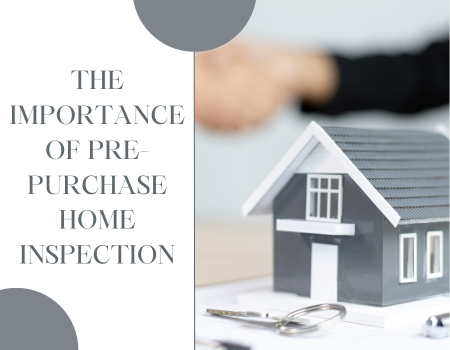Buying a home is a significant milestone for most people, especially first-time buyers. It’s a thrilling experience filled with anticipation, but it’s also a substantial financial investment. To protect this investment and avoid costly surprises, a pre-purchase home inspection is essential.
What is a Pre-Purchase Home Inspection?
 A pre-purchase home inspection is a thorough examination of a property’s condition by a qualified professional. The inspector assesses the property’s structure, systems, and components, identifying potential issues that may not be apparent to the untrained eye. This comprehensive evaluation provides valuable information to buyers, empowering them to make informed decisions.
A pre-purchase home inspection is a thorough examination of a property’s condition by a qualified professional. The inspector assesses the property’s structure, systems, and components, identifying potential issues that may not be apparent to the untrained eye. This comprehensive evaluation provides valuable information to buyers, empowering them to make informed decisions.
Why is a Pre-Purchase Home Inspection Important?
- Uncovering Hidden Problems: A home inspection can reveal underlying issues that could be costly to repair. These problems might include structural damage, electrical faults, plumbing leaks, roof problems, or HVAC system malfunctions. Discovering these issues before purchasing the home allows you to negotiate repairs or adjust your offer accordingly.
- Assessing Property Value: The inspection report can assist you in determining the property’s true value. If the inspector finds significant problems, you may be able to negotiate a lower purchase price. Conversely, a clean inspection report can reassure you that you’re making a sound investment.
- Peace of Mind: Knowing the condition of your future home can provide significant peace of mind. It allows you to anticipate potential maintenance costs and plan accordingly.
- Safety Concerns: A home inspection can identify safety hazards, such as faulty wiring, gas leaks, or structural instability. Protecting yourself and your family from these risks is paramount.
- Negotiation Tool: If the inspection reveals issues, you can use the findings to negotiate with the seller. You may request repairs, credits, or a lower purchase price.
What Does a Home Inspection Cover?
A typical home inspection includes a comprehensive evaluation of the following:
- Structure: The foundation, walls, roof, and overall structural integrity of the home.
- Roofing: The condition of the roof, including shingles, flashing, and ventilation.
- Attic and Insulation: The attic’s condition, as well as its ventilation and insulation levels.
- Plumbing: The water supply, drainage, fixtures, and water heater.
- Heating and Cooling Systems: The functionality of the HVAC system, including furnaces, air conditioners, and ductwork.
- Electrical System: The electrical wiring, panel, outlets, and lighting fixtures.
- Interior Components: Walls, floors, ceilings, and built-in appliances.
- Exterior Components: Siding, windows, doors, and decks.
Choosing a Home Inspector
Selecting a qualified home inspector is crucial. Get an inspector who is certified and has experience in your area. Read online reviews and request referrals from friends, family, or real estate agents.
Tips for First-Time Homebuyers
- Schedule the inspection early in the buying process: This allows ample time to address any issues before closing.
- Be present during the inspection: This enables you to ask questions and gain a better understanding of the property’s condition.
- Review the inspection report carefully: Understand the findings and discuss them with your real estate agent.
- Consider additional inspections: Depending on the property’s age or location, you may want to consider specialized inspections, such as radon testing, termite inspections, or well water testing.
When you invest in a pre-purchase home inspection, as a first-time buyer, you can protect yourself from costly surprises and make informed decisions about one of the most significant purchases of your life. If you need the services of a professional inspection and environmental testing, then Pristine Inspections and Testing is just the right company for you.
